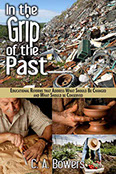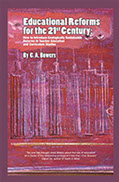Perspectives on the Ideas of Gregory Bateson, Ecological Intelligence, and Educational Reforms
By C. A. Bowers
With natural systems being exploited at an unsustainable rate, with technologies displacing the need for workers and now even professors, with print-based technologies undermining the intergenerational achievements in the areas of civil liberties and the cultural commons, it is now time for educational reformers to question the idea that students must be educated to become change agents...
In the Grip of the Past: Educational Reforms that Address What should Be Changed and What Should be Conserved
By C. A. Bowers
With natural systems being exploited at an unsustainable rate, with technologies displacing the need for workers and now even professors, with print-based technologies undermining the intergenerational achievements in the areas of civil liberties and the cultural commons, it is now time for educational reformers to question the idea that students must be educated to become change agents...
The Way Forward: Educational Reforms that Focus on the Cultural Commons and the Linguistic Roots of the Ecological / Cultural Crises
By C. A. Bowers
This latest book by Chet Bowers provides a more in-depth examination of several themes he has introduced before, as well as an introduction to issues that other environmental and educational writers have ignored. The former includes understanding cultures, including daily cultural practices, as ecologies—and how these micro-ecologies affect the life-sustaining viability of natural ecologies. Also explored in greater depth are how the community-centered cultural commons represent the early stages of a post-industrial future, as well as how public schools, universities, and environmental writers continue to perpetuate the linguistic colonization of the present by the past and the linguistic colonization of other cultures. Special attention is given to how to reframe the meaning of words (metaphors) in ways that are culturally and ecologically informed...
Universitiy Reform in an Era of Global Warming
By C. A. Bowers
This book is especially timely for reasons related to the current efforts on the part of several national organizations to promote sustainability reforms in courses in all academic disciplines. The American Association for Sustainability in Higher education is in the forefront of this reform effort. Replacing an inefficient campus infrastructures was easy when compared to the challenges of engaging faculty in discussions of how the content of their courses continue to reinforce the deep cultural assumptions that gave conceptual direction to the individualistic/consumer-dependent lifestyle that is now widely recognized as unsustainable...
Educational Reforms for the 21st Century: How to Introduce Ecologically Sustainable Reforms in Teacher Education and Curriculum Studies
By C. A. Bowers
There are international and national educational organizations now promoting the introduction of sustainability thinking into teacher education programs and curriculum studies. As there will be increased pressure for undertaking sustainability-oriented reforms, this book introduces three of the most critical areas that affect teacher decision-making in the classroom and community...
A Historical Detour That May Be Fatal:
What We Can Learn from the Luddite’s Community-Centered Approach to Technology
By C. A. Bowers
It is now popular to claim that anyone who questions modern technologies, especially the digital revolution that is sweeping around the world, is a Luddite. Like so many of our labels, this one misses what was really important about the efforts of the Luddites to resist the machines that were introducing a new economic order that was radically different from the role technology played in the pre-industrial communities in the English Midlands. The enclosing of the English commons during the latter years of the 1700s, and the establishment of steam driven machines was the beginning of the Industrial Revolution. As Kirkpatrick Sale noted, this revolution introduced fundamental social changes ignored by those who use the label of Luddite to dismiss the critics of technology. As he noted:
All that “community” implies—self-sufficiency, mutual aid, morality in the market place, stubborn tradition, regulation by custom, organic knowledge instead of mechanistic science—had to be steadily and systematically disrupted and displaced. All of the practices that kept the individual from being a consumer had to be done away with so that the cogs and wheels of an unfettered machine called “the economy” could operate without interference, influenced merely invisible hands and inevitable balances… (1995, 38)
Dismissing the Luddites as reactionaries also involves ignoring the importance of the self-sufficient communities they were defending...

Eco-Justice Press, L.L.C. © 2011-2023








